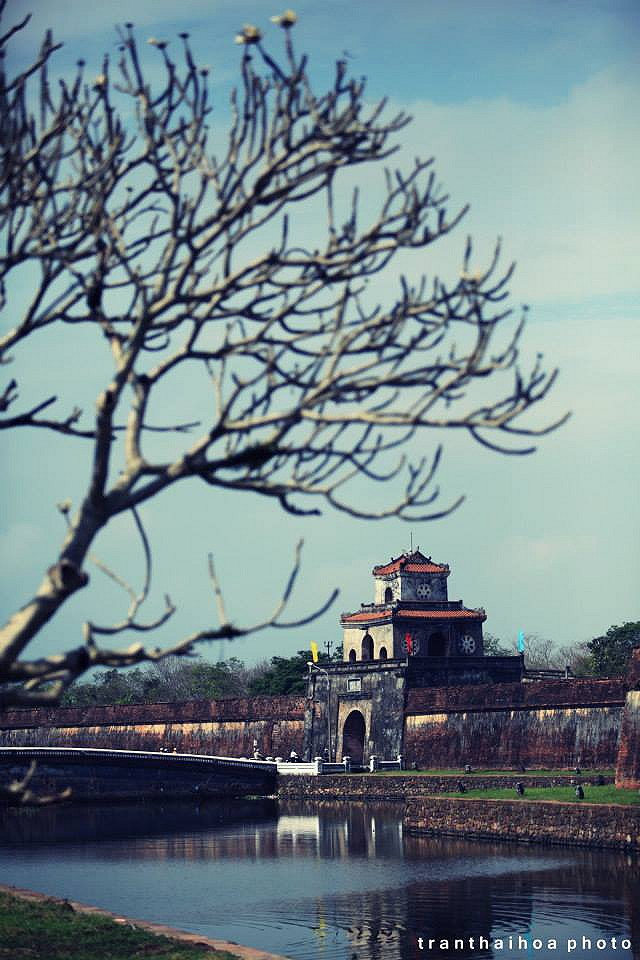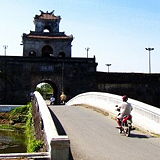
|
Cua Ngan Hue, Thua Thien Hue, Vietnam Last Updated: 12/17/2024 |
| Cửa Ngăn (cua The Nhan) is a historical site that holds cultural and architectural significance. Cua Ngan is situated in the heart of Hue City, which is known for its rich history as the former imperial capital of Vietnam. It is located in the Phu Hoa neighborhood, which is within close proximity to many other notable landmarks and attractions in the city. | |
| Historical Significance: Cua Ngan is agate that was part of the fortification system surrounding the imperial city during the Nguyen Dynasty, which ruled Vietnam from 1802 to 1945. The gate served as an entrance to the city and played a role in its defense. Architectural Style: Cua Ngan showcases traditional Vietnamese architectural elements. It features a grand and imposing gate structure with intricate designs, representing the craftsmanship and architectural prowess of the Nguyen Dynasty. Cultural Heritage: The gate, along with other remnants of the fortification system, is a testament to the historical and cultural heritage of Hue. It reflects the city's significance as a center of political power and cultural development during the imperial era. Tourism and Visit: Cua Ngan is open to visitors who are interested in exploring Hue's history and experiencing its architectural marvels. Tourists can visit the gate, learn about its historical context, and capture photographs of its impressive architecture. Additionally, guided tours and cultural heritage programs are available to provide more insights into the site. Nearby Attractions: Cua Ngan is surrounded by other attractions in Hue City that are worth exploring. These include the Imperial City (Citadel), Thien Mu Pagoda, Tomb of Emperor Gia Long, Tomb of Emperor Khai Dinh, and many other historical sites that contribute to the rich cultural landscape of the city. Cua Ngan in Hue City, Thua Thien Hue Province, Vietnam, offers visitors the opportunity to immerse themselves in the historical and cultural heritage of the region. Its architectural beauty and connection to the imperial past make it a noteworthy site to explore while visiting Hue. | |
Vietnam » Hue
Place » Historical Place
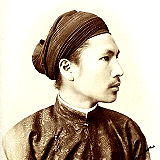
|
Vua Ham Nghi Place » Historical Place Vua Ham Nghi, whose birth name was Nguyen Phuc Ung Lich, was the 9th emperor of the Nguyen Dynasty in Vietnam. He was born on August 3, 1871, and ascended to the throne in 1884 at the age of 13. His reign was short-lived and marked by resistance against French colonial rule. 205 views 💖 1 👍 024290 Thonac, France |
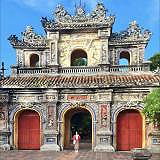
|
Cua Hien Nhon Place » Historical Place Hien Nhon Gate (Cửa Hiển Nhơn) is one of four gates located in the East of the Hue Imperial Citadel to enter and leave the Citadel. Hien Nhon Gate was built in 1805 under the reign of King Gia Long. 170 views 💖 1 👍 0Đoàn Thị Điểm, Thuận Thành, Huế, Thừa Thiên Huế |

|
Cua Ngo Mon Place » Historical Place The Citadel Gate (Cổng Ngọ Môn) in Hue, Vietnam, is the main entrance to the Imperial City, a UNESCO World Heritage site and the former capital of Vietnam during the Nguyen Dynasty. The Citadel Gate is one of the most iconic structures within the Imperial City and serves as the entrance to the Forbidden Purple City, which was reserved exclusively for the emperor, his family, and his royal concubines. 462 views 💖 5 👍 0Thua Thien Hue, Vietnam |

|
Cua Chanh Dong Place » Historical Place Cua Chanh Dong hay cua Dong Ba (Chanh Dong Gate) is located in the east and is one of the ten main gates of Hue citadel. Dong Ba Gate was built in 1809 under the reign of King Gia Long. By the reign of King Minh Mang, it was solidly built and completed as it is today. 274 views 💖 1 👍 097 Đường Xuân 68, Phú Hậu, Huế, Thừa Thiên Huế |
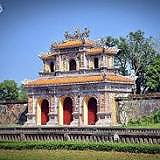
|
Cua Chuong Duc Place » Historical Place Cửa Chương Đức (Chuong Duc Gate) is one of four doors to enter the Hue Imperial Citadel. It is located in the Le Huan street, Thua Thien Hue. 138 views 💖 1 👍 0Lê Huân, Thuận Hoà, Huế, Thừa Thiên Huế |
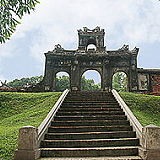
|
Dien Voi Re Place » Historical Place Dien Voi Re (Mieu Long Chau) or Elephant Zoo is a famous historical site located in Thuy Bieu, Thua Thien Hue, Vietnam. It is a historical relic of a herd of elephants under the Nguyen dynasty. This unique relic is the vestige of Hue ancient capital. 381 views 💖 4 👍 0Ngõ 26 Kiệt, 373 Bùi Thị Xuân, Thủy Biều, Huế, Thừa Thiên Huế |

|
Duong No Place » City Dương Nỗ Ward was established based on the entire natural area and population of three communes: Phu Duong, Phu Mau, and Phu Thanh. The headquarter is located in Mau Tai residential area, Duong No ward, Hue city. 136 views 💖 0 👍 0Hue, Vietnam |
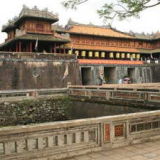
|
Kinh Thanh Hue Place » Historical Place Hue Historic Citadel (Kinh thành Huế), located in Hue City, Vietnam, was the capital of the Nguyen Dynasty from 1802 to 1945. The Imperial City was built in the early 19th century during the reign of Emperor Gia Long and was designed to reflect the unique cultural and architectural traditions of Vietnam. 520 views 💖 4 👍 1Hue City, Vietnam |
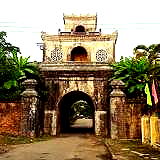
|
Cua Trai Place » Historical Place Cua Trai or Ke Trai of which the main name is Dong Bac Mon (Cua Dong Bac), is located in the northeast corner of Hue Citadel, on the west bank of the Dong BaRiver. The arch was built in 1809 under the reign of King Gia Long, and the upper floor was built in 1824 under the reign of King Minh Mang. 159 views 💖 1 👍 0Phu Binh, Hue, Thua Thien Hue, Vietnam |

|
Thai To Mieu Place » Historical Place Thái Tổ miếu is a historical site dedicated to the worship of the first kings of the Nguyen dynasty. The construction of Thai To Mieu began in 1806 during the reign of Emperor Gia Long and was completed in 1833 during the reign of Emperor Minh Mang. The temple complex covers an area of over 7,000 square meters and features a range of traditional Vietnamese architectural styles. 374 views 💖 3 👍 0Đoàn Thị Điểm, Phú Hậu, Huế, Thành phố Huế |
